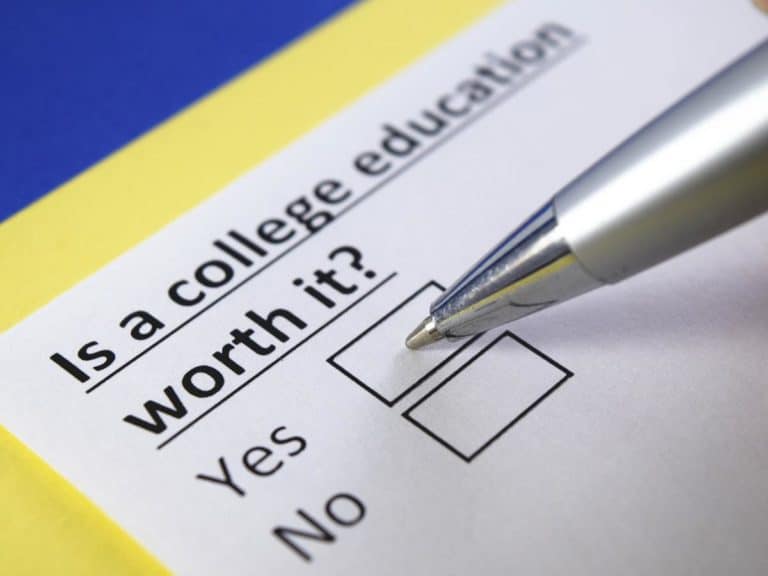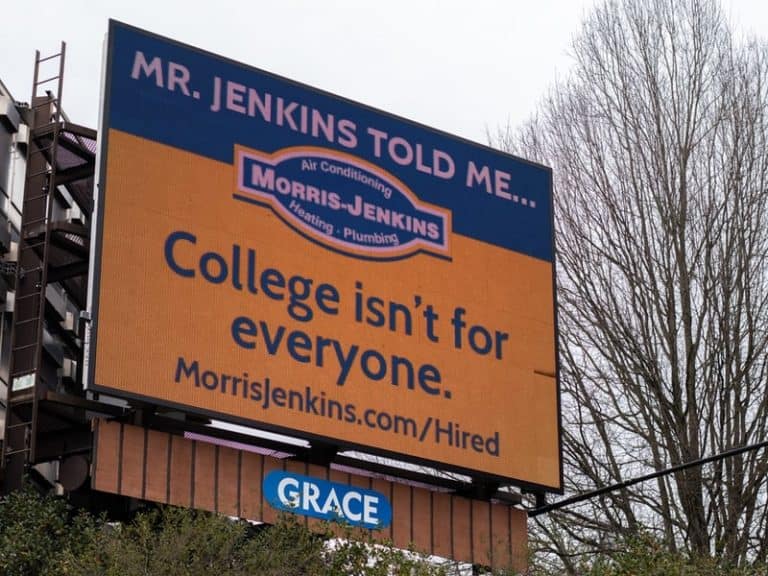Why is a College Degree Important to Employers?
There are five crucial parts of a resume.
One of those is education, which comes after the work experience section — it takes the place of experience for individuals seeking employment for the very first time.
According to the American Association of Colleges and Universities (AAC&U), about 82% of business executives and 75% of hiring managers completing college is essential.
So, why is a college degree important to employers?
There are two primary reasons why many employers want a college degree:
- It gives a candidate knowledge of one’s area of concentration and prospective job position.
- It implies that the degree holder demonstrates soft skills such as perseverance, discipline, problem-solving, critical thinking, leadership, teamwork, and communication.
It’s worth pointing out that not all employers or industries require a college degree.
Yes, there are certain fields where you cannot work without meeting minimum higher education requirements, such as in legal, engineering, and healthcare areas.
However, many skill-based jobs require no more than a high school diploma.

College Degree vs. Work Experience: Which is More Important?
Both a college degree and work experience are major role players in having a lucrative career.
However, one is more important than the other, depending on where you are in your life as a working adult.
Therefore, you must leverage either your college education or relevant hands-on industry experience at the right moment if the goal is to meet your particular career goal.
Jumpstarting Your Professional Life With a College Degree
Every professional adult has to begin somewhere.
In the case of college graduates applying for a job for the first time, hopping from one hiring manager to the next armed with a resume and an undergraduate degree is the starting point of their being members of the labor force.
Employers have to measure a candidate’s eligibility for the position in question.
With zero job experience, fresh college graduates are gauged based on the college degrees they wield.
Is the applicant’s major related to the vacant position? Does the individual have the necessary skills obtained from the classroom and extracurricular participation?
And do companies check your degree to see if it’s accredited?
Given that your undergraduate degree serves as a testament to various hard and soft skills in the absence of real-life experience, companies certainly check the validity of any presented college degree.
So, why is college important?
For those without any previous job, the college experience matters a lot when starting a professional career.
Letting Work Experience Take Over After Some Time
Generally, the longer you have been a part of the workforce, the less important your college degree becomes.
But let me clarify that it applies mostly to your initial postsecondary credential.
In many situations, you must further your education by earning a higher-level degree, obtaining certificates, or taking additional courses to move along the career ladder.
However, sooner or later, professional experience becomes a more important hiring criterion than college.
For instance, it’s not unlikely for hiring managers to focus more on work history when choosing from among highly qualified candidates with pretty much similar educational backgrounds.
A college degree gets you hired early in your career, but work experience takes over later.
How will a degree benefit my company?
That may be the question your first prospective employer may have in mind.
However, your subsequent prospective employers will focus less on your college degree and zoom in more on each and every industry experience you have had throughout your life as a professional.

Do All Jobs Require Candidates to Have College Degrees?
Not all jobs require a college degree.
Although many career opportunities require candidates to have an undergraduate degree as a minimum educational qualification, some do not warrant a qualification higher than a high school diploma.
Why a degree is important for job hunting is on a case-to-case basis.
In most business, tech, legal, education, and healthcare jobs, a college degree is a must, especially where individuals must pass standardized examinations and obtain professional licenses.
Meanwhile, most skill-based careers do not require candidates to have any college experience.
However, it’s not uncommon for some of these jobs to necessitate certificates, training, and related experience.
Best Jobs Without a College Degree
According to the Center on Education and the Workforce at Georgetown University, around 36% of all job openings by 2020 will not require an educational credential beyond a high school diploma.
So, in other words, no college degree doesn’t mean no job!
US News has a list of the best jobs without a college degree, although it indicates that while some allow you to dive in after high school, others require some form of training or certificate completion.
Check out the table below.
It enumerates jobs for those who didn’t go to college and their respective salaries and projected job availability.
| Job Position | Average Annual Salary | Projected Jobs |
|---|---|---|
| Flight attendant | $63,760 | 12,600 |
| Electrician | $60,240 | 49,200 |
| Plumber | $60,090 | 10,900 |
| Hearing aid specialist | $59,020 | 1,500 |
| Wind turbine technician | $57,320 | 5,000 |
| Sheet metal worker | $55,350 | -200 |
| Licensed practical nurse | $54,620 | 34,900 |
| Carpenter | $51,390 | 8,600 |
| Choreographer | $50,990 | 300 |
| Bus driver | $50,890 | 8,400 |
| Massage therapist | $49,860 | 24,600 |
| Medical records technician | $47,180 | 16,500 |
| Auto mechanic | $46,970 | 12,800 |
| Community health worker | $46,190 | 9,400 |
| Solar photovoltaic installer | $45,230 | 6,600 |
| Maintenance and repair worker | $44,980 | 57,200 |
| Construction worker | $40,750 | 61,900 |
| Delivery truck driver | $40,410 | 133,800 |
| Optician | $39,610 | 2,000 |
| Ophthalmic medical technician | $38,860 | 8,400 |
| Medical assistant | $38,270 | 105,900 |
| Pharmacy technician | $37,790 | 25,900 |
| Security guard | $34,750 | -14,900 |
| Teacher assistant | $30,920 | 900 |
| Taxi driver | $30,670 | 36,400 |
Jobs That Require a College Degree
The US Bureau of Labor Statistics (BLS) says that around 50% of all jobs require some type of college degree.
It means that these professions require any of the following:
- Associate degree
- Bachelor’s degree
- Master’s degree
- Doctoral degree
- Professional degree
Do employers check for a degree?
Definitely!
Especially in fields where higher education is an absolute must, hiring a degree-less person is a no-no.
Reasons why college is important for certain jobs can vary from employer to employer and from industry to industry, which means there is no one specific rationale behind such a requirement.
In most instances, degree holders demonstrate job readiness.
Many employers see them as individuals who possess more vital hard and soft skills than non-degree ones.
Some careers require people who have specialized knowledge and competence, which, in some situations, are essential for procuring professional qualifications and licenses.
The BLS categorizes degree-requiring jobs into the following:
- Business, management, and sales
- Computer and engineering
- Education, social service, and legal
- Healthcare
- Media, arts, and sports
According to BLS, the following are some of the highest-paying jobs from these various industries:
| Job Position | Average Annual Salary | Projected Jobs in the Next Decade |
|---|---|---|
| Physicians and surgeons | $208,800+ | 22,700 |
| Computer and information systems manager | $151,150 | 42,400 |
| Financial managers | $134,180 | 64,200 |
| Lawyers | $126,930 | 46,000 |
| Physician assistants | $115,390 | 12,200 |
| Nurse practitioners | $111,680 | 26,000 |
| Software developers | $110,140 | 189,200 |
| Medical and health services managers | $104,280 | 51,800 |
| General and operations managers | $103,650 | 229,600 |
| Information security analysts | $103,590 | 16,300 |
| Health specialties teachers | $99,090 | 30,800 |
| Database administrators and architects | $98,860 | 13,900 |
| Art directors | $97,270 | 11,500 |
| Computer systems analysts | $93,730 | 47,500 |
| Physical therapists | $91,010 | 15,600 |
| Mechanical engineers | $90,160 | 20,200 |
| Management analysts | $87,660 | 99,400 |
| Special effects artists and animators | $77,700 | 7,800 |
| Producers and directors | $76,400 | 15,600 |
| Registered nurses | $75,330 | 194,500 |
| Writers and authors | $67,120 | 15,400 |
| Editors | $63,400 | 11,200 |
| Secondary school teachers | $62,870 | 77,400 |
| Elementary school teachers | $60,940 | 110,800 |
| Middle school teachers | $60,810 | 44,400 |
Why do employers want college graduates?
Earlier, I mentioned that a college degree not only shows you have knowledge in your chosen area of concentration or career but also demonstrates the possession of various soft skills, from problem-solving to collaboration.
In many instances, having a degree is crucial simply because the nature of the job requires one.
Read Next: The Opportunity Cost of Attending College
Disclaimer: The views and opinions expressed in this article are those of the authors and do not necessarily represent those of the College Reality Check.





